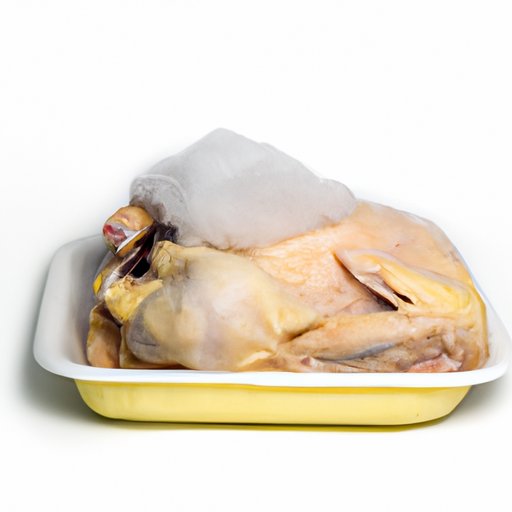
Introduction
If you’re a fan of chicken, then frozen chicken is an incredibly convenient option. You don’t have to worry about it going bad as quickly as fresh chicken, and you can use it in a variety of dishes. However, knowing how long you can keep frozen chicken is essential to ensure your meals are enjoyable and safe to eat. In this article, we’ll explore everything you need to know about frozen chicken, including storage durations, safety tips, quality preservation, and recipe ideas.
Recipe Ideas for Using Frozen Chicken: A Comprehensive Guide to Storage Durations
First things first, let’s explore how long you can keep frozen chicken. Whole chickens will last in the freezer for up to a year, while cut-up pieces will only last for four to six months. Cooked chicken can be stored for about two to six months. However, it’s worth noting that the taste and texture of the chicken can deteriorate over time, and it’s best to use it within the recommended durations for the best results.
Now, onto the fun stuff, recipe ideas! Frozen chicken works well in soups, stews, casseroles, and stir-fries. A great option for using up leftover cooked chicken is to make a salad with some fresh greens, tomatoes, and a vinaigrette dressing. Another great recipe to try is a chicken pot pie. Simply use a thawed pie crust and add in the cooked chicken, mixed vegetables, and a creamy sauce.
What You Need to Know About Frozen Chicken: Safety, Storage, and Quality
It’s essential to be aware of safety concerns when it comes to frozen chicken. Bacteria, such as salmonella, can still be present on frozen chicken, and it’s important to handle it with care. Always wash your hands after handling the chicken, and cook it to an internal temperature of at least 165°F to kill any bacteria. Additionally, it’s crucial to store frozen chicken at or below 0°F to prevent any bacteria from growing.
While frozen chicken can be a convenient option, it can also impact the texture and flavor of the meat. To preserve the quality of frozen chicken, it’s best to use it within the recommended storage durations, thaw it slowly in the refrigerator, and avoid refreezing it after it has been fully thawed.
How to Defrost and Cook Frozen Chicken Safely: Tips and Tricks for Busy Weeknights
Defrosting frozen chicken safely is essential to ensure that it cooks evenly and to avoid any bacterial growth. One of the best ways to defrost frozen chicken is to use the refrigerator. Simply place the chicken in a container or on a plate and let it thaw slowly in the refrigerator for 24 hours. If you’re in a rush, you can also use the cold water method. Submerge the sealed chicken in cold water and change the water every 30 minutes until it’s thawed. Never thaw chicken in warm or hot water, as it can promote bacterial growth.
When it comes to cooking frozen chicken, using a slow cooker or pressure cooker can be a lifesaver. These appliances allow you to cook the chicken from frozen, reducing prep time and ensuring the meat cooks evenly. Just be sure to follow the manufacturer’s instructions for cooking times.
The Frozen Chicken Conundrum: When to Unthaw and When to Discard
Knowing when to discard frozen chicken is crucial to ensure that your meals are safe to eat. If chicken has been stored in the freezer for too long, it can develop freezer burn or discoloration. Freezer burn occurs when moisture evaporates from the chicken, and the meat becomes dehydrated. It’s safe to eat, but it can impact the texture and taste of the chicken. Discoloration can be a sign of freezer burn or spoilage, and it’s best to discard any chicken that has become discolored or has an unusual odor.
Freezing Chicken: A Step-by-Step Guide to Maximizing Freshness
If you’re looking to freeze chicken, it’s essential to prep it correctly to maximize freshness. Start by wrapping the chicken tightly in plastic wrap or aluminum foil to prevent air from coming into contact with the chicken. Then, place the wrapped chicken in a freezer bag and remove any excess air. Label the bag with the date and contents, and store it at or below 0°F.
To maximize the freshness of frozen chicken, use high-quality freezer bags and avoid overcrowding the freezer. When you’re ready to use the frozen chicken, thaw it in the refrigerator overnight, or use the cold water method. Avoid thawing chicken in warm or hot water, as it can promote bacterial growth.
The Science of Frozen Chicken: Understanding the Factors that Affect Retention of Taste and Nutritional Value
Now, onto the science of frozen chicken. Freezing can impact the taste and nutritional value of chicken, but there are ways to preserve these factors. First, avoid overcooking frozen chicken, as it can become dry and lose flavor. Additionally, consider marinating the chicken before freezing to add flavor and tenderness. Finally, freeze the chicken as soon as possible after it’s been prepared to preserve its nutritional value.
Conclusion
Frozen chicken is a convenient, affordable, and versatile ingredient that can be used in a variety of dishes. However, storing it correctly and using it within the recommended durations is essential to ensure that your meals are safe and delicious. Use the tips and recipe ideas we’ve covered in this article to make the most out of your frozen chicken.




